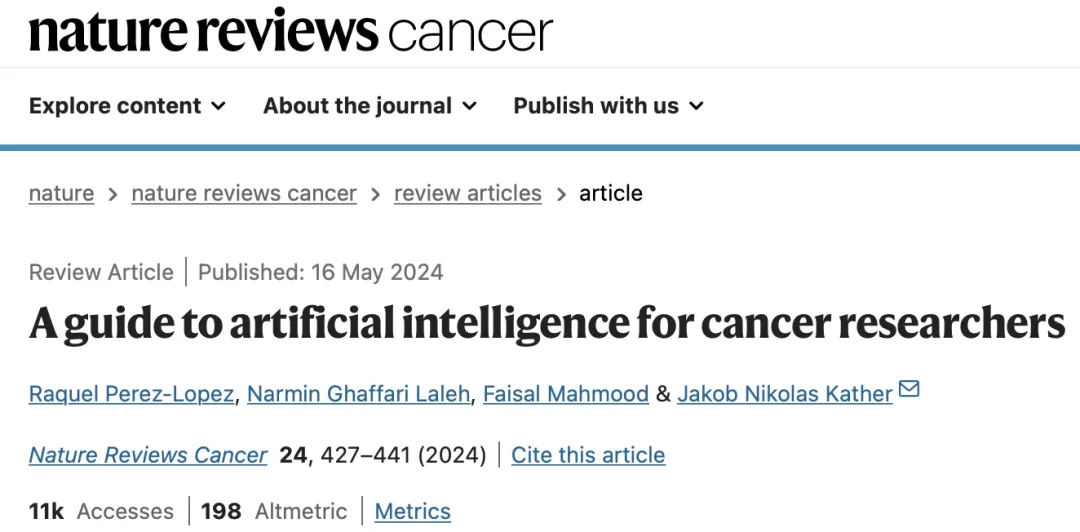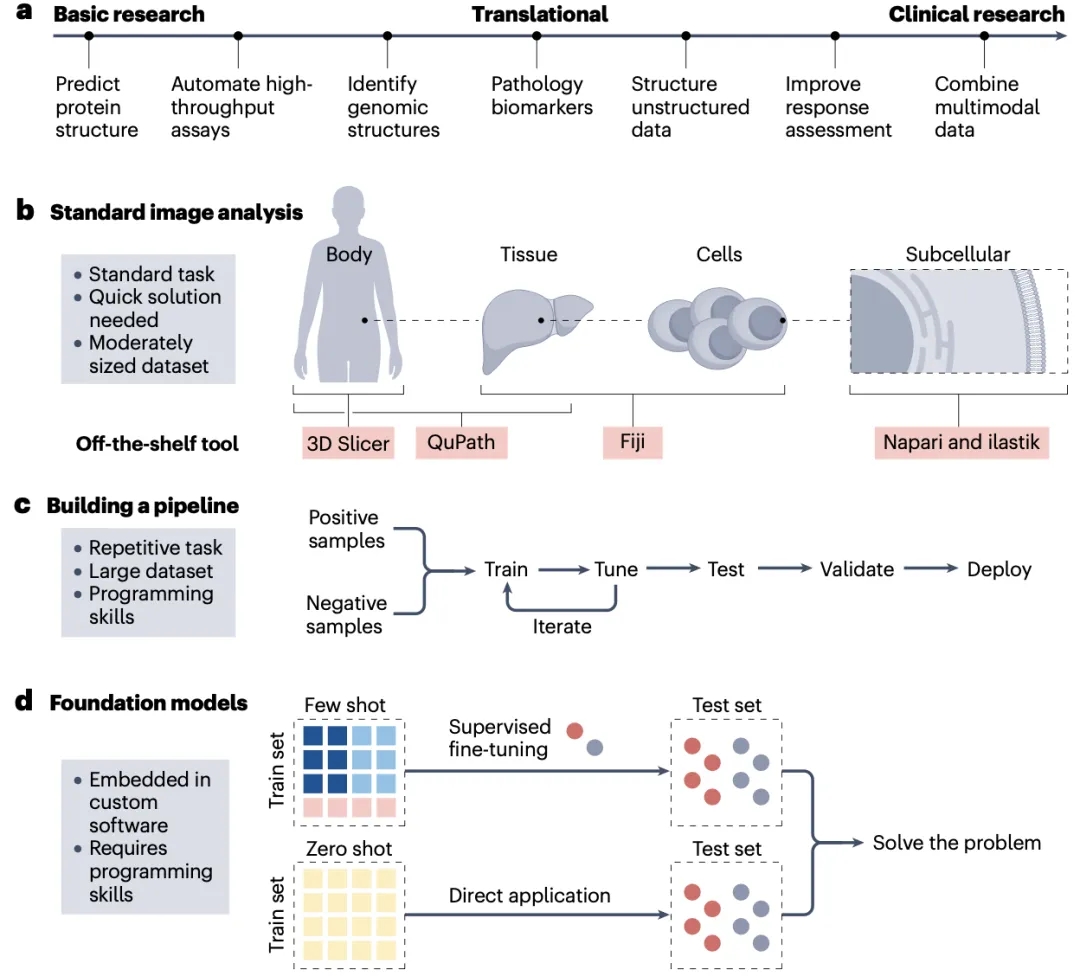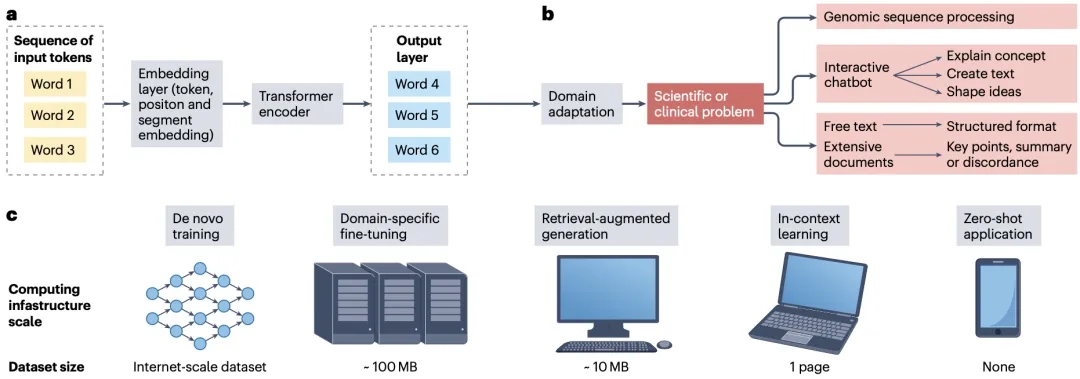From the Zhiyaobang Web
Artificial intelligence has realized commercialization, from professional resources to cancer researchers tool is easy to obtain. Ai-based tools can not only improve research productivity in daily workflows, but also extract hidden information from existing data, thereby driving new scientific discoveries. To master the basic knowledge of these tools are beneficial for each cancer researchers. Traditional researchers in biology research background based on AI can be used by the ready-made software tools, and computing background more researchers can develop their own software process based on AI.
On May 16, 2024, Nature Reviews Cancer published a review: A guide to artificial intelligence for cancer researchers, for the calculation of the background cancer researchers provides A practical guide and help them to understand how the AI tool for their benefit.

This review aims to provide a practical guide, focus on cancer research in artificial intelligence related key concepts and tools, including image analysis, natural language processing (NLP), and the application of drug discovery, the researchers will also illustrate the calculation how to effectively use the AI in their work.
Artificial intelligence is a set of computing technology, designed to make the machine can carry out the tasks of usually performed by humans. Over the past few decades, AI has gradually evolved from a theoretical construct to a powerful tool in the real world. Especially in the field of biomedical research, the application of AI has achieved remarkable results. Cancer, as one of the major diseases threatening human health, its research has been closely watched. In recent years, the AI applications in cancer research is increasing, for cancer prevention, diagnosis and treatment provides a new thought and method.
In cancer research, AI technology can help researchers extract useful information from massive data, discover new scientific rules, and improve research efficiency. The application of AI in cancer research mainly depends on the artificial neural network (ANN) and deep learning.

Figure 1 Artificial Intelligence workflows in cancer research.
一、Applications of AI in cancer research
1、Picture Analysis
Image analysis is a crucial link in cancer research. Whether observing cell samples by microscopy or evaluating tumor conditions by medical imaging techniques such as CT scan or MRI, large amounts of image data need to be processed and analyzed. AI techniques, especially deep learning algorithms, have made remarkable progress in this field. By training the neural network to identify specific patterns in the image, the researchers can rapidly and accurately detect tumors, assessment of tumor size and location, and predict treatment effect, etc., to provide evidence for personalized treatment options.
2. Natural Language Processing
In the biomedical field, natural language processing (NLP) technology is widely applied to extract useful information from a large number of text data. For cancer researchers, this may include key data extracted from the medical literature, patient information extracted from clinical reports, as well as from social media and other sources to collect public opinion associated with cancer. AI driven NLP tools can help researchers rapid processing and analyzing these data, found new clues to study, and accelerate the process of scientific discovery.

Figure 2 Text-based hypothetical AI workflow in cancer research
3. Drug Discovery
Drug discovery is another important field in cancer research. The traditional drug discovery process is often time-consuming, and the success rate is low. The introduction of AI technology has brought new possibilities for drug discovery. Machine-learning algorithms allow researchers to predict the biological activity of compounds, optimize drug design, and accelerate the screening process of candidate drugs. In addition, the AI can also be used to optimize drug design, improve drug efficacy and reduce side effects.
二、How can non-computational researchers begin to use AI
For cancer researchers with a non-computational background, getting started with AI can be challenging. However, with the emergence of a growing number of off-the-shelf software and tools, the process has become much easier. Here are some suggestions to help non-computational researchers start using AI effectively in their own work.
1. Understand the basic concepts
First of all, it is very important to understand the basic concepts and technical principles of AI. This includes understanding of machine learning, deep learning, the basic concepts, such as neural networks and how they are applied in different areas in cancer research. By reading the literature and to participate in the online course, researchers can create a basic understanding of AI technology.
2. Choose the right tool
It is very important to choose the appropriate AI tool according to one's research needs and skill level. Many software and tools are readily available to choose from, including deep-learning frameworks for image analysis, text mining tools for natural language processing, and predictive models for drug discovery. The researchers can search through online resources or consulting experts to find their own tools.
3. Learn to use tools
Once you select the appropriate tools, researchers will need to learn how to use them. Including to understand the interface and function of the tools, master the methods of data preprocessing and model training, and learning how to explain and evaluate the model results. Researchers can gradually master these skills by consulting documentation, attending training sessions, or communicating with other users.
4. To seek cooperation
For non-computational researchers, collaborating with computational experts or data scientists may be a good option. By working with them, the researchers can obtain further guidance and technical support, to better use the AI tool for cancer research.
5. Practice
Finally, it is very important to apply AI techniques in practical research. Through practice in their own research projects using the AI tool, the researchers can gradually familiar with these tools, operation method, and found them in the potential and limitations in the study of cancer. At the same time, they can also share their experiences and achievements with other researchers to promote the wide application and development of AI in cancer research.
Summary
Artificial intelligence has become an integral part of cancer research, for cancer prevention, diagnosis and treatment provides a new thought and method. This paper provides a practical guide on the application of AI in cancer research for cancer researchers with non-computational background. In the future, with the continuous development and improvement of AI technology, we have reason to believe that it will bring more breakthroughs and progress to cancer research.
Solemnly declare: in this paper, all peer originator, reprint articles only for the purposes of the transmission more information, such as the author information tag is wrong, please contact us to modify or delete the first time.







